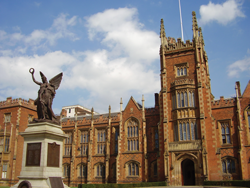Higher education strategy
 An increased emphasis on subjects needed in the economy and research collaboration between universities and business is central to the new strategy.
An increased emphasis on subjects needed in the economy and research collaboration between universities and business is central to the new strategy.
The province’s first higher education strategy, published by Employment and Learning Minister Stephen Farry, emphasises the need to produce graduates for a knowledge economyBy 2020, the number of students with Level 6-8 qualifications (first degrees to doctoral degrees) in economically relevant subjects should have increased to at least 22 per cent from a baseline of 18 per cent in 2008. The proportion of those employed with Level 4-8 skills (higher national certificates and vocational qualifications to doctoral degrees) and above should increase from 33.2 per cent in 2008 to “at least” 44 per cent by 2020.
Higher education institutes (HEIs) will be encouraged to increase the involvement of SMEs in EU research programme applications to widen the local economy’s R&D base. Universities will implement plans to ensure a “significant increase” in the drawdown of EU research funding.
To maintain knowledge transfer between universities and business, the Connected programme and the Higher Education Innovation Fund will receive increased funding, but no figures are specified.
The current funding model (a mixture of government funding and student fees) will be reviewed. By 2020 a model that facilitates additional capacity, an increase in part-time study, a focus on economically relevant activity and the sharing of resources should be in place. A DEL spokeswoman explained that this review may not commence until initial progress has been made on related projects e.g. a flexible lifelong learning system.
Acknowledging the likely increase in demand for undergraduate places, due to comparatively higher tuition fees in the rest of the UK, the department will review the maximum student number (MaSN) restriction by 2016.
Students’ employability will be enhanced, it promises, through pressure to ensure that all students can avail of a work placement.
Increasing participation among low income groups will be dealt with in a separate strategy. The higher education strategy does, however, commit to improving access among people in rural areas by planning for a pilot scheme to use further education colleges as university bases.
To support lifelong learning, the department hopes to introduce a single credit and qualifications framework by 2017. The framework, along with a flexible learning system (e.g. more online courses), will support courses consisting of individually credited modules which, combined, can lead to a higher education qualification.
In the Assembly, the DUP’s Alastair Ross welcomed the recognition of the need to align higher education more closely with the needs of the economy. Sinn Féin’s Cathal Ó hOisín queried how the sector would help shape cultural diversity. Farry responded that DEL will encourage universities to be a strong source of cultural development.
UUP MLA Basil McCrea questioned the merit of increasing the number of PhD places (from 500 to 1,000 by 2020) but Farry warned that Northern Ireland had a weaker postgraduate profile than other UK regions. The SDLP’s Pat Ramsey welcomed the proposed reviews of the MaSN and funding policy.
TUV MLA Jim Allister criticised the strategy’s commitment to increase cross-border undergraduate mobility while “there is nothing to suggest our universities will be encouraged to attract students from the rest of the UK.” Allister also criticised the “unacceptable” absence of any mention of “the dreadful under-representation of the Protestant community”.
Students from Great Britain will pay lower fees here in most cases than if they were studying at home. Separately, Farry told agendaNi that “there is no pervasive under-representation of Protestants in higher education,” but that his widening participation strategy will address low participation among young Protestant men from highly deprived areas.
The University and College Union welcomed the strategy as an “important statement” on the future and a commitment by government to a high quality service.





